Books
The Lost Leader
A. N. Wilson
Beyond the Pale: Sir Oswald Mosley 1933-1980 Nicholas Mosley (Seeker and Warburg £8.95) I t so happened that, just before I opened the second volume of Nicholas Mosley's life of his father, I had been rereading my favourite novel about a political fanatic. Born of a diabolically unpleasant aristocratic line, Redgauntlet has channell- ed many of his more disagreeable con- genital characteristics into political fervour. For him, there is an answer to everything. He despises the English not merely because he is a Jacobite and a Scot, but because of their combination of intellectual woolliness with moral smugness. Darsie Latimer, our young hero, tried to suggest that 'an Englishman's best privilege' is freedom. He receives the crushingly absurd reply (true fanatics always love to generalise), 'The privilege of free action belongs to no mor- tal'.
Darsie Latimer, of course, does not
realise it at the time, but he is Redgauntlet's son. Scott's novel is therefore partly a political adventure story about a man who fails to see that his obsolete political creed was doomed to failure from its birth. It is also the story of a young man coming to terms with his monstrous father, and find- ing that there is something to love and ad- mire even in his doggedness. There are few more heroic moments in literature than when, parting from his son on the shore, old Redgauntlet says that the doom has departed from his house, 'since its present representative has adhered to the winning side. I am convinced that he will not change it, should it in turn become the losing one'.
Within hours of wiping away a manly tear at this scene, I was in Holloway Prison in 1943. A young British army officer has smuggled a bottle of brandy and some gramophone records into the cell. A meal has just been enjoyed, cooked by the prisoner's wife, who shares his apartments. There have been aubergines cultivated by the prisoner himself on his own allotment,
and fraises du hots. And now, his earnest and religious young son wants to discuss Nietzsche. Kirsten Flagstad shrieks the airs of Wagner's lsolde on 'the gram', as they call it; and the older man tries to explain to the younger why Nietzsche valued the unlikeable quality of Harte, hardness or cruelty. Lest he missed the point Sir Oswald Mosley wrote to this son about it as soon as the conversation was over, 'Re Harte, the old boy would probably reply — "No beau- ty nor nobility in Harte, agreed; but what have men (majority) done to Beauty and Nobility — destroyed the one and persecuted the other. What then is the answer of the emerging Ubermensch to this situation except Harte?" ' The ludicrously Wodehousian phrase 'the old boy' to describe the sinister Teutonic philosopher is a tiny indication of The vast dichotomy which lay at the heart of Oswald Mosley's mystery. Beyond the Pale makes no attempt to displace Robert Skidelsky's straight account of that extraor- dinary political career. Nor, like his first volume, Rules of the Game, does it make any attempt to view Oswald Mosley 'dispas- sionately. It is not the story which we already know of Mosley's public life, but the story of Nicholas Mosley's relationship with his father. He moved from a position of absolute hero-worship, and toe-ing of the Party line, to a feeling, after his father's imprisonment, of intimacy and love. Throughout the Thirties, Oswald Mosley had been so taken up with politics and social life that there had not been much time for conversation with his stammering and hopelessly neurotic first-born son. In prison, there was a flowering of the rarest and most awkwardly managed form of love, that of a son for his father. In time, of course, Nicholas Mosley saw the limitations of Nietzsche, and came to see, in Christiani- ty, qualities stronger than Harte. Through the influence of an Anglican monk, a bril- liant spiritual director as well as a pacifist of the extreme left (Father Raymond Raynes CR) he threw off the fascist yoke, and of course, in so doing, was estranged from his father. He writes of his father's political proclivities as though they were a species of addiction like alcoholism. A couple of years after the war, for instance, Nicholas Mosley drove his father and step-mother to a pub in the East End for a party reunion. 'My father had been the joking family father in the back of the car; now he became urgent, with his chin up, striding'.
It might be said that the whole book revolves around this contrast, and Nicholas Mosley's puzzlement at it. In more glorious days, 1939, Sir Oswald had filled the Earl's Court stadium and held 20,000 people in thrall with his magnetic rant. After the two- hour harangue, he repaired to his mother's flat for dinner. 'Suddenly he put his head round the door so that he was like a clown popping his head through the curtain; he looked mock-penitent. Someone said "You promised!" He came into the room and gave himself a pat on the behind ond said "Naughty!" This was a reference to a pro- mise he had given to my Aunt Baba that in his speech he would say nothing unpleasant about her friend Lord Halifax!'
The scene dissolves into English laughter, and Mosley fils is left gazing upon it, as upon the whole of his father's life, with chilled puzzlement. He evolves the theory that there was a complete split and division in what another author has described as 'a life of contrasts'. The fanatic, for instance, poured .£100,000 of his own money into the movement, and made hypnotic speeches in which he denounced the usurers and inter- national financiers who were bleeding our economy. But the clever country gentleman, who was the other side of this split personality, easily recouped the £100,000 by wise speculation on the Stock Exchange. Nicholas Mosley implies that the reason few members of the British Union formed part of the Leader's social circle was that there was a complete dichotomy between the smiling clever family man, and.
the raving blackshirt revolutionary. It may have been so. But then, his mother and both his wives were fervent party activists and few supporters of the BUF would have been the sort 'one would have in the house'.
The mystery, at the end of two volumes, re- mains a mystery, of how anyone with any sense of humour at all (Sir Oswald's was clearly strong) could have arrayed himself in his ridiculous uniform, spewed out nonsense to crowds of roughnecks, and ex- pected the English electorate to take him seriously. Nicholas Mosley, as the mixed-up but ultimately loving son of this most ar- resting figure was the last person in the world to be able to give a dispassionate answer to these things. As the professional novelist that he is, he has presented the rnost rivettingly credible story, and it is only at the end that one finds its credibility spurious. Surely Sir Oswald Mosley ought to remain incomprehensible?
One thing which does emerge from this book is how fatally Sir Oswald failed to understand the British temperament and the British people. From 1934 onwards, he could have been studying Pont's cartoons Of the British Character. They would have done him very much more good than his slavish desire to ape foreigners. It was this, I am sure, which people hated about him, more than any of the specific items of his Political programme.
All political slogans rebound upon themselves, few more so than the British Union's unexceptionable Mind Britain's Business! at the time of the Abyssinian crisis. At the beginning of the war, Mosley was accused of having accepted money
from a foreign power. The novelist Henry Williamson, an ardent fascist, said that he
and thousands like him would have Withdrawn support from the movement had these rumours been true. Mosley denied the
rumours hotly, but pointed out that the DadY Herald had received over 05,000 of Russian money during the 1920s. Alas, Mosley was lying. As his son has now established (photostats of the documents are here reproduced) the BUF received
something like £60,000 per annum between 1933 and 1935 from the Italian Govern- ment. Mussolini only withdrew his support when he discovered that Mosley had form- ed an alliance with Hitler, then out of favour with the Duce.
In this, Mussolini failed to grasp a fun- damental fact about Mosley's class and nationality at this period, that is, he was wholly the victim of the fatal Victorian pro- Germanism which to the modern taste seems so extraordinary. The image of Sir Oswald sitting in his prison cell during the war, reading Goethe and Nietzsche and playing Wagner on 'the gram' is pathetical- ly absurd. Mosley liked to represent himself as a rebel to his class and culture but almost any reasonably cultivated Victorian or Edwardian gentleman would have chosen the same books and gramophone records for his prison cell. The English governing class, in spite of anti-Hun propaganda which they allowed to circulate in the vulgar press during the First World War, con- tinued to love the Germans. This was the chief reason for their refusal to re-arm, dur- ing the 1930s, until it was nearly too late. When they did so, they were able to tell themselves that they were not fighting their beloved Germany, but having a crusade against the nazis.
But when, since a brief expeditionary Elizabethan fiasco in the Low Countries much discouraged by the Government of the day, has Great Britain ever fought an ideological war? Chamberlain declared war on Hitler because he was tangled up in treaties from which he would dearly have loved to extricate himself. Mosley was not alone in pointing this out, but he did so from a curious vantage point. His own pro- Germanism made of the British Union something which in all its trivial forms aped the barbaric bully-boys of the SS. The teutonic paramilitary ideal had been tried before in England and, once naturalised, it had been gloriously successful. One of Mosley's closest advisers, Major General J. F. C. Fuller pointed out to him that 'Every great movement starts off in a minority of one — e.g. the Salvation Army or even the Boy Scouts'. (The Major General, who emerges from Nicholas Mosley's account like one of the battier eccentrics of Anthony Powell's imagination, was an enthusiast for Aleister Crowley, and had a scheme for im- prisoning all the Jews in the world on Madagascar). Mad as Fuller was, his ex- amples of Baden-Powell and 'General' Booth shewed that the English could absorb the paramilitary. With postman's uniforms, and brass bands and the music of Arne and Parry, Mosley might have captured many more hearts. Instead, he had to have jack- boots, hysterical ranting, street violence ('One must keep the boys happy' was how he justified this to his son) the ceaseless playing of the Horst Wessel Lied and slapstick challenges to 'international finance' made not to the family broker who was keeping his portfolio booming, but to the poverty-stricken inhabitants of the East End. The unquestioned folly of all this was sparked off directly by his Edwardian love of the Germans, which had nothing to do with any of the excellent features of his political programme: nothing to do with his distributist economic principles; nothing to do with his contempt for the ineptitude and humbug of parliamentary politics, nothing to do with his spiritual and intuitive patriotism. The fact that his more unplea- sant followers, like William Joyce, endeavoured to make themselves exactly like Hitlerites of the coarsest grain would have been reason enough to expel them from the BUF if Mosley had really meant the slogan Mind Britain's Business! But the more Germanic he became, the less he could be redeemed by humour.
One of the most splendid things about Nicholas Mosley's account is the faith he has come to place in the redemptive power of laughter. He says he has attempted to create an attitude `by which the darkness in people (there is always darkness) might be made to seem not so much evil as somewhat ridiculous: evil may thus be exorcised: ridiculousness becomes life-giving'. Unfor- tunately, fatally, Oswald Mosley's humour and his politics were kept in quite separate compartments. When Mosley had appen- dicitis in 1936, Magda Goebbels (who was to arrange their wedding) wrote to Diana Guinness, 'I sincerely hope that the Leader very quickly recovers'. The idea that any in- dividual could be referred to, in private cor- respondence, as 'the Leader' is hilariously untranslatable into an English context.
Having read Lady Mosley's own ironical account of things in A Life of Contrasts, and now this story by her step-son, one finds it so extraordinary that any English person could have used the language of fascism seriously that one falls back on the unpleasant thought that it was all a Gargan- tuan and rather evil `Mitford tease'.
One feels this particularly in the embar- rassing tone which Mosley allowed his followers to adopt when writing of the Jews. Again, as well as being humourless, it is simply unEnglish to rant against `submen with prehensile toes' or 'hairy troglodytes who crept out of the ghettoes of Germany to seek sanctuary in the British Museum'.
The tone of General Fuller, William Joyce and the rest was not merely disgusting, expressing what few people thought and no English person would say. It was also foolish, since it lost the British Union its most valued patron, Lord Rothermere, who could not afford to an- tagonise Jewish advertisers. As it happens, though fascism by its very nature distorts the truth, one can readily believe Lady Mosley's repeated assertion that her hus- band was the least anti-semitic man she has ever known. The remark takes on a dif- ferent colouring when one remembers some of the men she has known (her own father, Dr Goebbels, and Hitler himself) but there is no reason to doubt it, any more than one questions the testimony, quoted by Nicholas Mosley, of Sir Oswald's black gamekeeper: that in his employer's corn-
pany alone did he feel no self-consciousness about race.
Lady Mosley, incidentally, emerges from this book extremely well, even from the end note which announces that 'she has asked that it should be made clear that she is not associated in any way with these memoirs, and that she strongly disapproves of many of my interpretations and of the publication of private letters'. Presumably she disap- proves of the general public being told that, even after his second marriage, Sir Oswald continued his occasional love affair with 'Baba', sister of his first wife and married to his friend 'Fruity' Metcalfe. She would also have reason to disapprove of the un- necessary malice which prompted Nicholas Mosley to reproduce conversations he allegedly had with his father — 'about Mummy and Diana. He used to say — as if he were making a special point of this — of course his second marriage was very good, but his first marriage had been perfect.' This is a perfectly understandable remark for a father to make to a son. Even had he loved his second wife more, he would not have said so to the boy. In any case, how can such things be judged? But the reproduction of the exchange, indeed the entire publication, is yet another trial to Lady Mosley's steely courage.
'There was a story of how my father and she had been driving once on a mountain road in France and he had had to back the car to turn it and he asked her to look out of the window and to tell him when to stop; when the back wheels were half over the precipice, she had murmured, "Vaguely
In terms of his political aspirations, there is no record of her murmuring 'Vaguely wo'. It was she who introduced Sir Oswald to Hitler, after her sister Unity had been en- tranced by the sight of him in his 'sweet mackintosh' in the Osteria Bavaria restaurant in Munich. She told Nicholas Mosley that her encounter with the Ftlhrer had 'ruined my life. And I think it ruined your father's.' That realisation did not pre- vent her from exhibiting her wedding pre- sent from the Ftihrer (signed photograph in frame) well after the beginning of the war. Today, no less than her husband, Lady Mosley is 'beyond the pale'. Radio inter- viewers, for example, subject her to abusive and insulting questions which would be un- thinkable in addressing anyone else. The hounding of the Mosleys since 1940, their imprisonment without trial, and the subse- quent concealment of all the evidence relating to that imprisonment, make sham- ing reading. Normally, all documents are made public after 30 years; but the At- torney General has decreed that no one must know the truth about Mosley's jai- prisonment for 100 years.
As someone asked in another context, Which was the face that launched a thou' sand ships: Sir Oswald Mosley or Sir Staf- ford Cripps? What are they all feeling so guilty about? Doubtless, they wish to sup- press the names of English politicians who were sympathetic to Mosley. PerhaP5 • Nicholas Mosley is right in his suggestion that Attlee, Greenwood and the others who
could not forgive Mosley's defection from the Labour Party would only consent to serve in Churchill's cabinet on condition that the Leader was locked up. More fun- damentally, I believe it had to do with the English feelings of love/hate for Roman- tics. By making him a martyr, they cast Mosley in the Romantic role, compelling him to suffer as Byron and Oscar Wilde, for different types of Romanticism, had suf- fered. One of Nicholas Mosley's girl-friends had a father who exclaimed,' "I would rather shake hands with Oscar Wilde than with Oswald Mosley". I told my father this story: I imagined, somewhat naively, that
he would laugh, as he laughed about so many of the attitudes struck against him by a crazy world. But he said — "Does her father think I'm a bugger?" 'Pathetically, he did not quite see that he was 'beyond the pale'.
Like Wilde, Mosley plunged from mar- tyrdom into squalor. His son only allows us the briefest glimpse of him in old age in Le Temple de la Gloire, drinking pink cham- pagne with his grandchildren, and trying to dissuade them of the truths of Christianity. The unforgettable image which this power- ful novelist plants in our minds is 21 years earlier, when his father was fighting the election as the Union Movement Candidate for North Kensington, in 1959. As a young man in his 20s, when he had left the Conser- vative Party and stood as an independent, Oswald Mosley still retained his Harrow seat with a majority of over 7,000. As an old man, 'with his grey hair and grey suit' he lost his deposit, getting less than 3,000 of a total of 34,912 votes. 'There was Dad on top of a van again and bellowing'. That 'again' has the painful confessional ring of a child who thought his parent cured of alcoholism, but had come home to find the old man pouring gin into a tooth-mug. 'There he was roaring on about such things as black 'men being able to live on tins of cat food, and teenage girls being kept in attics'. The scene is electrifyingly embarrassing. It led to the great estrangement between the father and his eldest son which colours the Shame and pathos of the whole book. The geniality of Sir Oswald at the end is explain- ed, in this view, by the notion that the good Side of his nature never wanted the fascist revolution to take place at all; in fact, felt hearty relief at its failure. At the beginning Of Beyond the Pale, Sir Oswald seems like John Bayley's definition of a Shakespearean tragic hero in 'his un- suitability for the role'. At the end, he seems to have the comic pathos of an old man in Terence Rattigan who creeps off to the slums for cheap thrills. Nicholas Mosley's account is a devastatingly brilliant story in the unreliable tradition of Gosse's Father & Son. His is the ne plus ultra example of the bdarding-schooly phenomenon of embar- rassment at one's parents' weird ap- pearance or behaviour. Though written by a tnan of 60, this book has all the fresh
awkwardness of adolescent agony. And in the end, there is dogged filial pride mingled with heartbroken regret that Sir Oswald Mosley forfeited his claim to be thought of as a gentleman. He was not, after all, Redgauntlet, but something rather shab- bier.

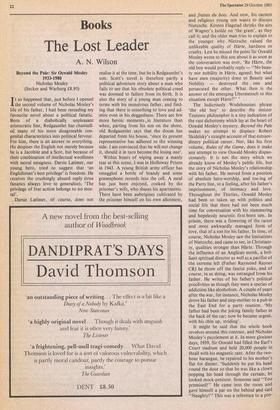
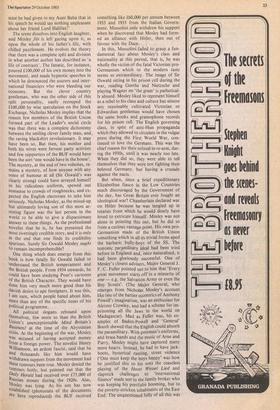
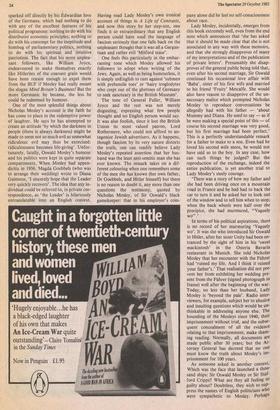
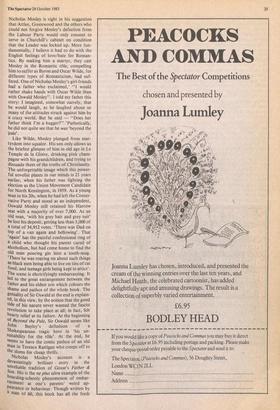
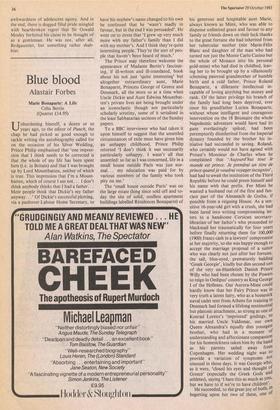












































 Previous page
Previous page